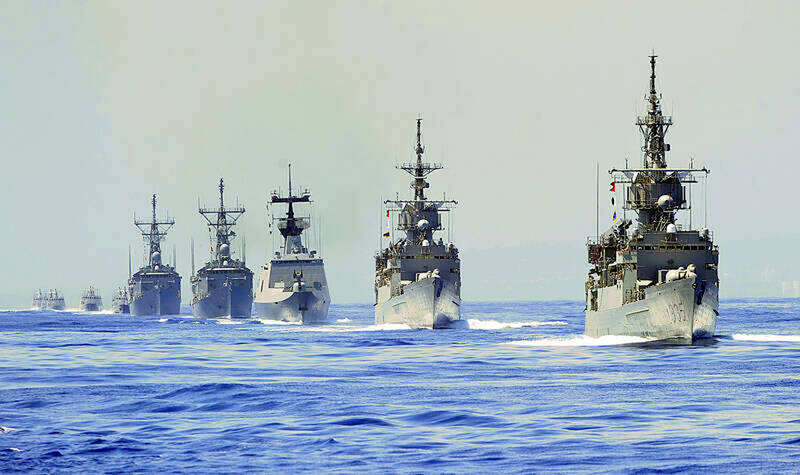Taiwanese defense experts have called for the nation to prioritize self-defense capabilities and missile acquisition after President William Lai (賴清德) on Friday pledge to raise the defense budget to 3 percent of Taiwan’s GDP to acquire military platforms from the US.
Lai said the government would propose a special budget this year for the increase.
Observers said that might increase this year’s defense budget by NT$150 billion (US$4.57 billion).

Photo: Liao Chen-huei, Taipei Times
The defense budget for fiscal year 2025 currently stands at NT$647 billion, or about 2.45 percent of GDP.
Whether the proposed budget increase, which requires legislative approval, would materialize remains uncertain.
Institute for National Defense and Security Research research fellow Su Tzu-yun (蘇紫雲) on Friday applauded Lai’s decision to increase defense spending, adding that it sent a positive message to the international community.
However, Su said purchasing more arms from the US should be made with Taiwan’s strategic needs in mind.
Taiwan’s priority should be increasing its self-defense capabilities, such as precision-guided missiles, anti-surface and anti-air missiles, National Advanced Surface-to-Air Missile Systems and drones for all three services, he said.
Only then should Taiwan turn back to acquiring larger platforms, he said.
Taiwan Security Association Deputy Secretary General Ho Cheng-hui (何澄輝) said that even if the US were willing to sell significant platforms such as Aegis-equipped ships and F-35 fighter jets, Taiwan would not receive them for another decade.
Taiwan should ask for technology transfers from the US, such as acquiring the blueprints for the Arleigh-Burke class frigate and the Aegis system or work with the US on joint manufacturing of naval ships equipped with the Aegis system, he said.
The nation should increase its storage capacity for missiles and step up training with the US, he added.
Asked about China’s increasing use of “gray zone” tactics, Ho said foreign think tanks’ suggestions of the air force increasing deployment of P-3C Orions were viable suggestions.
Alongside the nation’s indigenous uncrewed submarine development project, codenamed “Huilong” (慧龍), the nation should also consider purchasing more uncrewed submarines from the US to increase patrol frequency in the shallow waters west of Taiwan, which would also enhance the nation’s naval capabilities, Ho said.
Kuo Yu-jen (郭育仁), deputy director of the Institute for National Policy Research, said that Taiwan, like other countries, is beginning to increase defense spending per the demands of US President Donald Trump.
Kuo said the government should create a cross-ministry US committee that includes representatives from the military, and economic and technology experts to help form national policies and strategic goals to better protect Taiwanese interests.
Additional reporting by CNA

Taiwan is stepping up plans to create self-sufficient supply chains for combat drones and increase foreign orders from the US to counter China’s numerical superiority, a defense official said on Saturday. Commenting on condition of anonymity, the official said the nation’s armed forces are in agreement with US Admiral Samuel Paparo’s assessment that Taiwan’s military must be prepared to turn the nation’s waters into a “hellscape” for the Chinese People’s Liberation Army (PLA). Paparo, the commander of the US Indo-Pacific Command, reiterated the concept during a Congressional hearing in Washington on Wednesday. He first coined the term in a security conference last

Prosecutors today declined to say who was questioned regarding alleged forgery on petitions to recall Democratic Progressive Party (DPP) legislators, after Chinese-language media earlier reported that members of the Chinese Nationalist Party (KMT) Youth League were brought in for questioning. The Ministry of Justice Investigation Bureau confirmed that two people had been questioned, but did not disclose any further information about the ongoing investigation. KMT Youth League members Lee Hsiao-liang (李孝亮) and Liu Szu-yin (劉思吟) — who are leading the effort to recall DPP caucus chief executive Rosalia Wu (吳思瑤) and Legislator Wu Pei-yi (吳沛憶) — both posted on Facebook saying: “I

Sung Chien-liang (宋建樑), who led efforts to recall Democratic Progressive Party (DPP) Legislator Lee Kun-cheng (李坤城), was released on bail of NT$80,000 today amid outcry over his decision to wear a Nazi armband to questioning the night before. Sung arrived at the New Taipei District Prosecutors’ Office for questioning in a recall petition forgery case last night wearing a red armband bearing a swastika, carrying a copy of Adolf Hitler’s Mein Kampf and giving a Nazi salute. Sung left the building at 1:15am without the armband and covering the book with his coat. Lee said today that this is a serious

A court has approved Kaohsiung prosecutors’ request that two people working for Democratic Progressive Party (DPP) Legislator Lin Dai-hua (林岱樺) be detained, as a probe into two cases allegedly involving her continues. The request was made on Friday, after prosecutors raided Lin’s two offices and the staffers’ residences, and questioned five on suspicion of contravening the Anti-Corruption Act (貪汙治罪條例). The people included the directors of Lin’s Daliao (大寮) and Linyuan (林園) district offices in Kaohsiung, surnamed Chou (周) and Lin (林) respectively, as well as three other staffers. The prosecutors’ move came after they interrogated Lin Dai-hua on Wednesday. She appeared solemn following